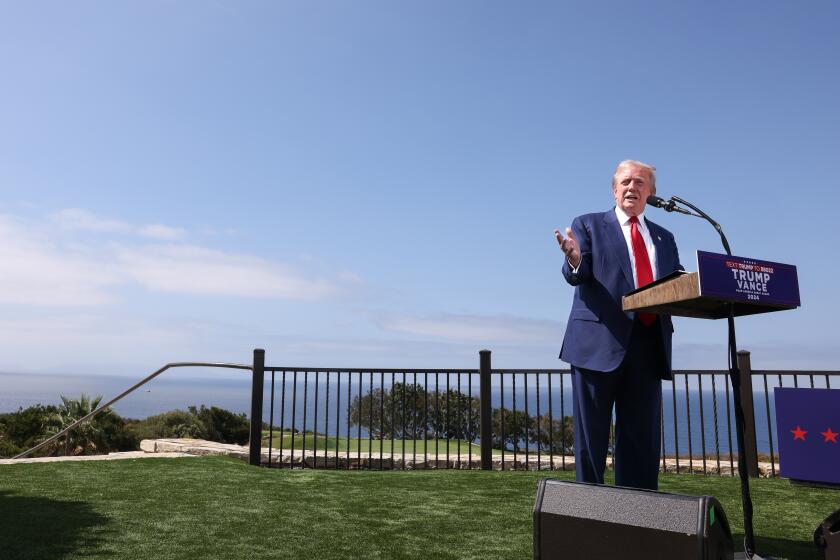A casual meeting between preoccupied presidents
There was a time in U.S.-Russian relations when any meeting between the leaders of the nuclear superpowers would command the world’s attention. The meeting starting this weekend between President Bush and Russian President Vladimir V. Putin in Kennebunkport, Maine, illustrates just how much times have changed.
Instead of phalanxes of aides shuttling between the two sides, each president will be accompanied by just two advisors. Instead of a stream of statements, senior officials say no significant agreements are expected. Instead of lengthy briefings or a full-fledged news conference, the two presidents are scheduled to answer just two questions apiece from a small group of reporters at the end of the visit.
In fact, Bush administration officials are pointedly trying to avoid any use of the term “summit.” Putin, who arrives today, is expected to spend less than 24 hours at the Bush family compound at Walker’s Point, and most of that time will be social and unstructured.
“Don’t expect a lot grand announcements,” a senior administration official said last week. “This is about the two men having a quiet, more informal conversation.”
One explanation is that after more than six years, Bush and Putin know each other well and would prefer an open agenda in a casual setting.
But another explanation is that there just isn’t much for the two countries to agree on these days. With U.S.-Russian relations at their lowest ebb in years and Putin sounding ever more bellicose toward the West, the warmest part of the relationship may actually be the rapport between the two men.
From the Kremlin’s point of view, the relationship has suffered from U.S. neglect.
“There is a great need for extra attention, extra attention on the highest level, in order not to let disagreements on either side overshadow our relations,” said Putin spokesman Dmitry Peskov. “This is the reason for getting together.”
The meeting was arranged at Russia’s request. Putin is on his way to Guatemala for a meeting of the International Olympic Committee, and Russian officials suggested that he stop in the United States on the way. The trip is likely to be one of his last as president; Russia moves into its election season this autumn, and Putin is expected to stay close to home.
“Kennebunkport represents the last real opportunity for the two presidents to try to reverse this downward slide that has characterized U.S.-Russia relations over the past several years,” said Steven Pifer, who until 2004 was deputy assistant secretary of State for Europe and Eurasia with responsibility for Russia.
Looking to legacies
In some ways, Bush and Putin find themselves in parallel circumstances. Both are moving into the final months of their two-term presidencies, and attention in their countries is increasingly trained on who will succeed them.
“They are both now playing for history and legacy, and I really don’t think that either of them wants, as part of his legacy, a trashed U.S.-Russian relationship,” said Andrew Kuchins, Eurasia program director at the Center for Strategic and International Studies.
The two also are preoccupied -- Bush with the deteriorating situation in Iraq, Putin with overseeing the process of choosing his successor.
“This meeting could be the last time for the United States and Russia to do business before both countries go into their election cycles,” said Dmitry Trenin, deputy director of the Carnegie Moscow Center think tank in Moscow.
But in other ways, the two leaders find themselves in very different circumstances.
Bush is at the nadir of his popularity, and his political influence, even within his own party, has greatly ebbed. Putin, on the other hand, enjoys the kind of sky-high favorable ratings from his countrymen that Bush had after the Sept. 11 attacks: According to a poll on global attitudes released last week by the nonpartisan Pew Research Center, 84% of Russians say they have confidence in Putin’s approach to world affairs, while just 45% of Americans say the same of Bush.
“Bush once said he looked into Putin’s eyes and saw his soul. This time he may look into Putin’s eyes and see his polls,” said Pew director Andrew Kohut.
One trait that has boosted Putin’s standing in his homeland has been his increasingly aggressive and anti-American statements. He has compared the United States to Nazi Germany and argued that the evils of the Stalin era were no worse than the loss of life caused by the U.S. dropping a nuclear bomb on Hiroshima.
In Washington, administration officials have decided that they need to spend a little more time with Putin or risk relations deteriorating to a dangerous level.
“Russia has not taken up a huge amount of time, and the relationship suffers. Plus, Putin has been really good at taking advantage of our decline,” said Sarah Mendelson, who studies human rights and national security at the Center for Strategic and International Studies.
Likely agenda
The two leaders are likely to report some progress in a few areas of mutual interest, particularly missile defense and nuclear energy cooperation.
Putin surprised Bush at the G-8 summit in Germany with an offer to give the United States access to its radar facilities in Gabala, Azerbaijan, in exchange for an agreement to halt development in Poland and the Czech Republic of missile defense systems designed to intercept an attack from Iran.
In the long run, U.S. officials say, the Gabala radar could not substitute for the early-warning radar planned for the Czech Republic. But it would give the two countries a vehicle for discussing their differences over missile defense, which the Bush administration has vowed to implement but which Russia views as an offensive system on its border. The two leaders are likely to announce that they are creating working groups to explore the possibilities of cooperation.
“They will not finalize anything,” said Igor Shuvalov, foreign policy advisor to Putin. “They will have another round of talks, but that is it.”
On nuclear energy, the two countries are close to concluding an agreement that would permit Russia to start importing spent nuclear fuel from U.S.-built reactors in countries such as Taiwan and South Korea. Russian officials have said they could make $20 billion from importing and storing such fuel.
The two sides are unlikely to make progress on the status of Kosovo. The United States favors the province becoming formally independent of Serbia, but Russia opposes it. The issue is deadlocked, and European support is eroding for a U.N.-brokered resolution that could lead to independence.
“There really are no obvious candidates for a breakthrough issue that would impart a positive momentum to the broader relationship,” Pifer said.
So the main goal of both sides appears to be a pleasant weekend in Maine: two presidents enjoying each other’s company, captured in cheerful photos.
And for the Russians, the more Bush treats Putin as an equal, the better the two countries are likely to get along in the transition months ahead.
“Let us be utterly frank. The main thing is that the U.S. and Russia should perceive each other as equal partners,” Russian Foreign Minister Sergei V. Lavrov said last month in Moscow. “A format other than this is unacceptable to us today.”
More to Read
Get the L.A. Times Politics newsletter
Deeply reported insights into legislation, politics and policy from Sacramento, Washington and beyond. In your inbox three times per week.
You may occasionally receive promotional content from the Los Angeles Times.










